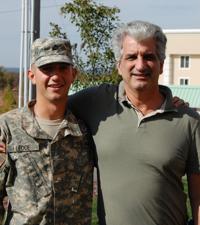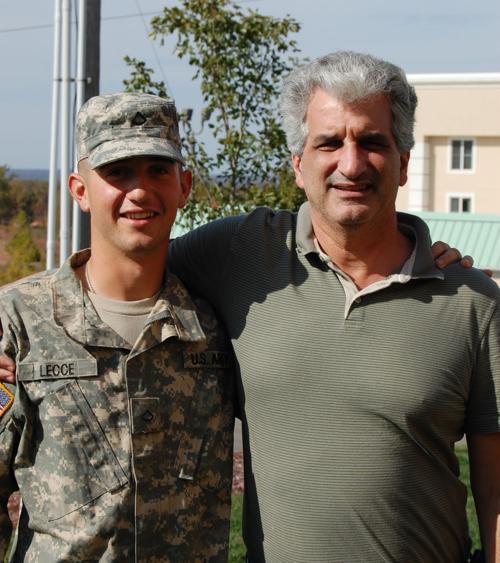As Richard Lecce’s chronic pain and depression persisted over last year’s holiday season, his wife and two college-age children became desperate to find him help.
His family says Lecce, an engineer and business analyst, wanted to get better, too.
For a family living in Aliquippa, Pennsylvania, in December, Sierra Tucson both fit their needs and looked breathtaking — a residential treatment center in a warm, desert location with views of mountains and resort-style accommodations. It was also one of a handful of facilities that would treat a dual diagnosis of pain and depression.
The facility, which tells patients to, “expect a miracle,” was extremely expensive and their health insurance did not cover it. So an aunt who considered Richard like a son cashed in savings certificates to help pay the $64,800 cost they were quoted — $1,800 per day minus a 20 percent “courtesy discount,” plus an extra $4,080 for one-on-one supervision, documents provided by the family show.
“We thought we had found the perfect place with Sierra Tucson’s promises,” said Richard’s wife, Lindsey Lecce.
But Sierra Tucson’s promises turned out to be not only empty but deadly, the family says in a lawsuit it filed against the facility in Pima County Superior Court. Citing the state’s Consumer Fraud Act, and what the family’s lawyer Dev Sethi calls a recent patient “suicide cluster,” the Lecces say Sierra Tucson misled them into thinking Richard would be safe while in its care.
Richard Lecce, 55, died on Jan. 23, nearly three weeks into his stay at Sierra Tucson. He hanged himself with a belt in his room and was found close to death at 12:41 p.m., an autopsy and subsequent state investigation showed. He was pronounced dead at 1:13 p.m.
None of the workers at Sierra Tucson noticed, until it was too late, that he’d missed all of his classes and appointments that day, records from the Arizona Department of Health Services show. Seven months after Lecce killed himself, another Sierra Tucson patient, also a man his 50s, died by suicide in his room.
Sierra Tucson’s CEO William D. Anderson said last week that since the matter is in litigation, he cannot comment. As of Friday, the private, for-profit facility had filed two motions in the court file — one asking for a change of venue to Pinal County and another asking the court to remove several paragraphs of the lawsuit because they are “redundant, immaterial, impertinent and scandalous and should be stricken.”
Among other things, Sierra Tucson says Sethi’s use of the phrase “suicide cluster” is both “scandalous” and “unsupported.”
The lawsuit says Lecce’s death is part of a “much larger, ongoing pattern of negligence and conscious disregard of substantial risk of catastrophic harm to a very vulnerable population, their own patients and their families.”
Other problems
Sierra Tucson, which is owned by Tennessee-based Acadia Healthcare, sits on 160 acres at 39580 S. Lago del Oro Parkway, on the Pinal-Pima County border.
The 32-year-old facility has programs to help patients with addictions, mood disorders, chronic pain, eating disorders and trauma through its “Sierra Model” of integrating therapies such as massage, yoga and acupuncture with traditional psychiatry. It holds two licenses — one for its 124 residential beds and another for its 15 acute-care, high-level psychiatric beds.
The facility, which has earned a reputation as “rehab for the stars,” has been heavily monitored this year by the Arizona Department of Health Services.
The lower-level residential facility was on a provisional license, with stepped-up monitoring by the state, from June 10 through Oct. 31 after state officials found it had not been following its own policies on keeping track of patients’ whereabouts.
The state could have decided not to license Sierra Tucson at the end of the provisional period. Surveyors from the state were at the facility all day Oct. 30 and late that day told the Star they’d determined that there were enough improvements to restore the license.
As part of restoring its license, Sierra Tucson had to pay the state $35,000 in civil penalties — $27,000 related to an investigation into an Aug. 27 patient suicide, plus $7,500 following an investigation into Lecce’s death.
Sierra Tucson has had to pay other, smaller fines to the state for violations, including $1,000 related in part to Lecce’s transfer on Jan. 12 from one of the high-level psychiatric beds to the lower-level residential facility. Lecce had been assigned one-on-one observation by a staff member while in high-level care. When he was transferred to lower-level care the one-on-one monitoring stopped, though there was no note in his record to discontinue it, a state report says.
Three suicides since 2011
Five Sierra Tucson patients have died since 2011, all of them men, ages 20 to 71. Autopsy reports concluded three of the patients, including Lecce, died of suicide. The lawsuit also cites a sixth patient, who drowned in Sierra Tucson’s swimming pool in 2006. That man’s family sued and the case was settled out of court.
An agreement signed by Anderson in October promised changes, including restrictions on who can be admitted to its residential program. It also agreed to keep patients with mood and anxiety disorders in a “ligature-free” environment. The three most recent patient deaths were of middle-aged men who hanged themselves — two with shoelaces and one with a belt.
The agreement calls for certain patients to be excluded from admission, including those with a current or active diagnosis of schizophrenia, a current or active diagnosis of dementia, five suicide attempts in a lifetime, three attempts in the previous 12 months or an attempt within 72 hours of the requested admission date.
Investigators from the Arizona Department of Health Services found that the most recent patient to commit suicide, a 59-year-old California man, had made two previous suicide attempts, had made a plan to kill himself with a gun while at home, and had an extensive family history of suicide — his aunt and father both killed themselves.
Sierra Tucson also agreed to “cautionary admission criteria” for middle-aged men with severe depression and accompanying problems including chronic pain, a family history of suicide and a lack of family or career support.
The changes did not happen soon enough for Richard Lecce.
“Everything to live for”
His family says Lecce flew to Tucson with his eldest child, a 23-year-old son who attends college in Florida and helped his dad settle in at Sierra Tucson, where he checked in on Jan. 4.
Lecce had never been in a residential treatment center before but he had been hospitalized in the past for mental health issues.
All of that was disclosed to Sierra Tucson, the family says.
“We were all hoping that he would find a balance of medications that would work for him, as well as learn new ways of coping with his pain and depression,” said Lindsey, 55, who is a night shift worker for FedEx at Pittsburgh International Airport.
“It was very difficult to go through med changes, and we thought it would be calming for him to be in a supervised, managed environment.”
State and court documents indicate Richard had a difficult stay at Sierra Tucson. He indicated thoughts of suicide and feelings of “total helplessness,” the civil action says. His family says he was both “sick and vulnerable.”
On the day of his death, Lecce did not show up for any of his five scheduled activities and appointments, and records based on interviews with staff members show no one looked for him until it was too late. If patients are 15 minutes late for an activity, staff is supposed to look for them, the facility’s policy says.
“Multiple staff interviewed by state regulators confirmed that they were ‘not sure who was responsible’ for taking attendance, reporting absences, and calling for a search,” the lawsuit says.
Richard and Lindsey had been married for 28 years. They met on the phone when Richard was a client at American Express Business Travel, where Lindsey worked.
“I experienced firsthand the absolute terror Richard felt when he got suicidal thoughts. It scared the hell out of him. He always reached out for help. I think that humans have a very strong urge to live and survive, so to have your brain chemistry so changed that the opposite becomes true is an awful thing,” Lindsey told the Star.
“Richard had everything to live for, and wanted to live. I don’t know what happened in his brain the last few hours of his life, other than he must have sunk to such a desperate low that he was unable to reach out, or he felt overlooked by the staff and gave in to those impulses.
“I have no doubt that had someone actually seen him and engaged with him and talked to him, he would not have taken his own life.”
On a handwritten note accompanying an enforcement agreement to pay the $7,500 fine in connection with Lecce’s death, Sierra Tucson officials said they were signing, “without any admission of violation, wrongdoing, or liability.”





